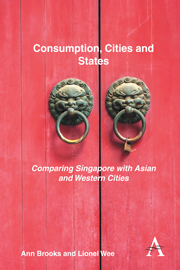Book contents
- Frontmatter
- Contents
- Acknowledgments
- Introduction
- Chapter 1 Consumption, Reflexivity and Citizenship in Global Cities
- Chapter 2 Orders of Reflexivity
- Chapter 3 Rescaling for Competitiveness
- Chapter 4 The Dynamics of State–Society Negotiations
- Chapter 5 (De-)Regulating Asian Identities: Comparing Asian Cities and States
- Chapter 6 Citizenship, Reflexivity and the State: Investigating ‘Defensive Engagement’ in a City-State
- Chapter 7 Governing the Citizen-Consumer: Citizenship, Casinos and ‘Cathedrals of Consumption’
- Chapter 8 Regulating Consumption and the ‘Pink Dollar’
- Chapter 9 States as ‘Midwives’ to Cities: Cosmopolitanism, Citizenship and Consumption in the Modern State
- References
- Index
- Frontmatter
- Contents
- Acknowledgments
- Introduction
- Chapter 1 Consumption, Reflexivity and Citizenship in Global Cities
- Chapter 2 Orders of Reflexivity
- Chapter 3 Rescaling for Competitiveness
- Chapter 4 The Dynamics of State–Society Negotiations
- Chapter 5 (De-)Regulating Asian Identities: Comparing Asian Cities and States
- Chapter 6 Citizenship, Reflexivity and the State: Investigating ‘Defensive Engagement’ in a City-State
- Chapter 7 Governing the Citizen-Consumer: Citizenship, Casinos and ‘Cathedrals of Consumption’
- Chapter 8 Regulating Consumption and the ‘Pink Dollar’
- Chapter 9 States as ‘Midwives’ to Cities: Cosmopolitanism, Citizenship and Consumption in the Modern State
- References
- Index
Summary
In this book we analyze the intersection of consumption and rights within the context of different states and cities in Asia and the West. We focus on the concept of the global city and consider a range of contested understandings within this concept.
We are interested in the cultural economy and political economy of the global city set in the context of globalization. Stevenson (2013, 38) notes, ‘In “wealthy nations” such as Japan, Australia, and those of North America and Western Europe, between 72 and 95 percent of the population lives in cities, whereas in Africa and Asia, the percentage is 38 and 41, respectively.’ Despite the figure for Asia, what is clear is that global cities are becoming the hallmark of growth in Asia. A key factor in the growth of cities globally in late modernity is neoliberalism. Theoretical debates around neoliberalism are thus explored in the chapters of this book. Stevenson observes that ‘Neoliberalism is also implicated in the increasing spatial division and fragmentation that is evident in cities around the world. Of significance is a deepening of the inequitable distribution of urban resources, which although taking a number of forms, is perhaps most highly visible in residential segregation’ (Stevenson 2013, 26).
Different cities offer different insights, and we draw on the Asian city-state of Singapore as an exemplar of an aspiring global city.
- Type
- Chapter
- Information
- Consumption, Cities and StatesComparing Singapore with Asian and Western Cities, pp. ix - xviiiPublisher: Anthem PressPrint publication year: 2014

